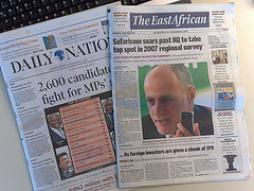Dr. Joel Selanikio believes in the value of the news. "It's one of my core beliefs that the more people know, the better decisions people are going to make," he said. Selanikio, the director of DataDyne.org, was recently awarded a Knight News Challenge grant for a project that distributes news on mobile phones.
Selanikio sat down with MobileActive for a discussion about his project. Selanikio isn't new to mobile phones. As director of DataDyne.org, he has used mobile phones for data collection with EpiSurveyor (read more about this in Wireless for Social Change: Trends in NGO Mobile Use.) He is also part of a consortium on mobile data collection, OpenROSA.
DataDyne's projects seek to take advantage of the ubiquity of mobile phones in the developing world. "Most of our projects are based on the idea that people in developing countries have gone out and purchased themselves some computers in the form of mobile phones," he said.
The Knight News Challenge project seeks to distribute news via mobile phones to areas that lack other access -- like newspapers or TV -- to news. Selanikio estimates that developing the technology for the project will take several months, and he hopes to be on the ground by late 2008. The news headlines will be delivered via SMS. "We want to start at the lowest common denominator and work our way up," Selanikio said. "If someone has web access that's not the audience we're looking for." The project will be tested in a developing country, probably in a rural area. "We were thinking about Kenya, but we're waiting to see if it becomes more stable," he said.
One of the components of the project will be the ability for users to rate stories. "One of the most interesting potential applications is the ability to allow to build in some sort of a rating system along the lines of New York Times' 'most emailed' stories," Selanikio said. "You can see headlines, or best-rated stories. It will be very customizable." He said that the rating system would allow people who view stories via SMS to submit feedback. "There isn't any method for people who don't have web access to have any influence on the news," he said. "This would allow that."
Selanikio said that the project is not just a pilot, but something that he hopes will be sustainable and continuous. "If the cell phone revolution has taught us anything it's that ideas of what is sustainable and what is not have to be revised," he notes. Selanikio sees several options for funding the SMS messages. The program could be advertiser supported, or Datadyne could work with large international organizations to intersperse public service messages with the news feeds. Selanikio also envisions working with carriers like Safaricom and news agencies to design a sustainable business model. "For example, the Kenya Times has a system in place to deal with advertisers. If you provide technology that's free to them that allows them to extend that model to SMS through no effort, they're very likely to jump at that." He said that one advantage of working in Africa is that receiving text messages is free, so people won't have to pay to use the services. "In a way what we're trying to do is to exploit this niche with not having to pay to receive SMS," he said.
Developing a long-term, sustainable business model may be one of the hardest parts of the project, Selanikio said. "The challenge I'm anticipating is getting Safaricom and the Kenya Times to sit down at the same table and find a way that is profitable and sustainable." He said that the project is potentially benefial to both parties. "The cell phone companies have an interest in increasing the reach of cell phones. Potentially Safaricom will make more money from the system than without the system." He believes that increasing people's ability to be informed and engage with the world will make the project worth it. "The population of people with cell phones has exceeded the number of people who get the news via watching TV or buying the paper. We have the potential of being able to inform a much larger population."
Photo credit to kikuyumoja.


Post new comment